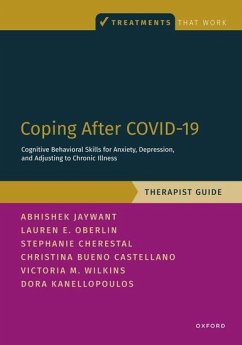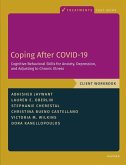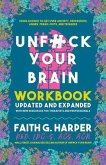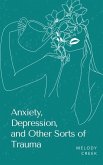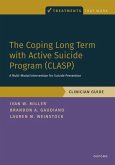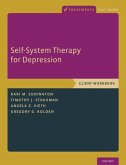Abhishek Jaywant (Assistant Professor, Assistant Professor, Weill C, Dora Kanellopoulos (Associate Professor, Associate Professor, Weill, Lauren Oberlin (Assistant Professor, Assistant Professor, Weill Cor
Coping After Covid-19: Cognitive Behavioral Skills for Anxiety, Depression, and Adjusting to Chronic Illness
Therapist Guide
Abhishek Jaywant (Assistant Professor, Assistant Professor, Weill C, Dora Kanellopoulos (Associate Professor, Associate Professor, Weill, Lauren Oberlin (Assistant Professor, Assistant Professor, Weill Cor
Coping After Covid-19: Cognitive Behavioral Skills for Anxiety, Depression, and Adjusting to Chronic Illness
Therapist Guide
- Broschiertes Buch
- Merkliste
- Auf die Merkliste
- Bewerten Bewerten
- Teilen
- Produkt teilen
- Produkterinnerung
- Produkterinnerung
The therapist guide contains information on how to conceptualize psychiatric symptoms in the context of COVID-19 within a cognitive behavioral framework, tips on conducting an initial intake assessment, and a suite of cognitive behavioral strategies to help clients manage emotional difficulties, cognitive challenges, fatigue, and sleep disturbances, tailored for COVID-19.
Andere Kunden interessierten sich auch für
![Coping After Covid-19: Cognitive Behavioral Skills for Anxiety, Depression, and Adjusting to Chronic Illness Coping After Covid-19: Cognitive Behavioral Skills for Anxiety, Depression, and Adjusting to Chronic Illness]() Abhishek Jaywant (Assistant Professor, Assistant Professor, Weill CCoping After Covid-19: Cognitive Behavioral Skills for Anxiety, Depression, and Adjusting to Chronic Illness40,99 €
Abhishek Jaywant (Assistant Professor, Assistant Professor, Weill CCoping After Covid-19: Cognitive Behavioral Skills for Anxiety, Depression, and Adjusting to Chronic Illness40,99 €![Unfuck Your Brain Workbook: Using Science to Get Over Anxiety, Depression, Anger, Freak-Outs, and Triggers Unfuck Your Brain Workbook: Using Science to Get Over Anxiety, Depression, Anger, Freak-Outs, and Triggers]() Faith G. HarperUnfuck Your Brain Workbook: Using Science to Get Over Anxiety, Depression, Anger, Freak-Outs, and Triggers25,99 €
Faith G. HarperUnfuck Your Brain Workbook: Using Science to Get Over Anxiety, Depression, Anger, Freak-Outs, and Triggers25,99 €![An Introduction to Coping with Depression, 2nd Edition An Introduction to Coping with Depression, 2nd Edition]() Lee BrosanAn Introduction to Coping with Depression, 2nd Edition14,99 €
Lee BrosanAn Introduction to Coping with Depression, 2nd Edition14,99 €![Anxiety, Depression, and Other Sorts of Trauma Anxiety, Depression, and Other Sorts of Trauma]() Melody CreekAnxiety, Depression, and Other Sorts of Trauma12,99 €
Melody CreekAnxiety, Depression, and Other Sorts of Trauma12,99 €![The Coping Long Term with Active Suicide Program (Clasp) The Coping Long Term with Active Suicide Program (Clasp)]() Ivan Miller (Clinical psychologist and Professor of Psychiatry anThe Coping Long Term with Active Suicide Program (Clasp)57,99 €
Ivan Miller (Clinical psychologist and Professor of Psychiatry anThe Coping Long Term with Active Suicide Program (Clasp)57,99 €![An Introduction to Coping with Anxiety, 2nd Edition An Introduction to Coping with Anxiety, 2nd Edition]() Brenda HoganAn Introduction to Coping with Anxiety, 2nd Edition16,99 €
Brenda HoganAn Introduction to Coping with Anxiety, 2nd Edition16,99 €![Self-System Therapy for Depression Self-System Therapy for Depression]() Kari M. Eddington (University of North Carolina at Greensboro)Self-System Therapy for Depression64,99 €
Kari M. Eddington (University of North Carolina at Greensboro)Self-System Therapy for Depression64,99 €-
-
-
The therapist guide contains information on how to conceptualize psychiatric symptoms in the context of COVID-19 within a cognitive behavioral framework, tips on conducting an initial intake assessment, and a suite of cognitive behavioral strategies to help clients manage emotional difficulties, cognitive challenges, fatigue, and sleep disturbances, tailored for COVID-19.
Produktdetails
- Produktdetails
- Treatments That Work
- Verlag: Oxford University Press Inc
- Seitenzahl: 272
- Erscheinungstermin: 28. November 2023
- Englisch
- Abmessung: 244mm x 185mm x 25mm
- Gewicht: 480g
- ISBN-13: 9780197699379
- ISBN-10: 0197699375
- Artikelnr.: 68105067
- Herstellerkennzeichnung
- Libri GmbH
- Europaallee 1
- 36244 Bad Hersfeld
- gpsr@libri.de
- Treatments That Work
- Verlag: Oxford University Press Inc
- Seitenzahl: 272
- Erscheinungstermin: 28. November 2023
- Englisch
- Abmessung: 244mm x 185mm x 25mm
- Gewicht: 480g
- ISBN-13: 9780197699379
- ISBN-10: 0197699375
- Artikelnr.: 68105067
- Herstellerkennzeichnung
- Libri GmbH
- Europaallee 1
- 36244 Bad Hersfeld
- gpsr@libri.de
Dr. Abhishek Jaywant is a clinical neuropsychologist with an NIH-funded research program focused on understanding and treating cognitive impairment and depression in individuals with medical/neurologic disorders including stroke, COVID-19, traumatic brain injury, and multiple sclerosis. He was the attending neuropsychologist on COVID-19 rehabilitation and recovery units at NewYork-Presbyterian/Weill Cornell Medicine in New York City during the early phases of the pandemic, treating over 100 COVID-19 patients. He was among the first to publish findings on neurocognitive impairment associated with COVID-19 for which he was recognized by the 2022 Neuropsychopharmacology Editors' Award for a Transformative Original Report (NEATOR Award). Dr. Dora Kanellopoulos is a clinical neuropsychologist who specializes in the assessment and treatment of cognitive dysfunction in the context of psychiatric illness. During the height of the 2020 COVID-19 pandemic in NYC, Dr. Kanellopoulos was an integral part of developing novel psychological interventions for healthcare workers and critically ill under-resourced patients who survived critical illness due to COVID infection. In the first year of the pandemic, Dr. Kanellopoulos treated COVID-19 survivors and healthcare workers, supervised other clinician volunteers, and created a free ongoing support group for survivors of serious medical illness due to COVID-19. Dr. Lauren Oberlin is an Assistant Professor at Weill Cornell Medicine and an Assistant Attending Psychologist at NewYork-Presbyterian. She is a neuropsychologist and leads a clinical research program focused on treatments to promote brain health and improve clinical and cognitive outcomes in aging and neurologic conditions. Dr. Oberlin contributed to the development of a psychological treatment program adapted for those experiencing persisting symptoms of COVID-19. She also helped implement a behavioral intervention for frontline healthcare workers delivered during the initial surge of the COVID-19 pandemic, and serves as co-investigator on a clinical trial evaluating a digital therapeutic for persistent cognitive difficulties following COVID-19. Dr. Stephanie Cherestal earned a Ph.D. in Clinical Psychology from Hofstra University. She serves as the director of the NYP-Westchester Behavioral Health Outpatient Dialectical Behavior Therapy (DBT) program, where she provides individual and group DBT treatment, and conducts supervision and training. She also serves as Co-Director of Diversity, Equity, and Inclusion in the Department of Psychiatry at Weill Cornell Medicine, which involves overseeing educational initiatives surrounding diversity, equity, inclusion, as well as recruitment policies and efforts to increase diversity within the department. Dr. Cherestal's research interests include exploring strategies for increasing dissemination of evidence-based psychotherapies to marginalized communities. Dr. Christina Bueno Castellano is a clinical neuropsychologist who specializes in culturally informed assessment and treatment of cognitive and psychiatric syndromes in the context of medical illness. She contributed to the development and implementation of psychological first aid and crisis management services for frontline health care workers and hospital staff impacted by COVID-19. At the height of the COVID-19 pandemic in 2020, Dr. Bueno provided treatment to COVID-19 survivors from underrepresented and marginalized communities to optimize the course of their recovery in outpatient rehabilitation following COVID-19 related illness and/or hospitalization. Dr Victoria Wilkins is a clinical psychologist specializing in health psychology and bereavement. She has worked extensively with individuals and families coping with acute and chronic medical illnesses, women experiencing perinatal and menopausal mood and anxiety disorders, and individuals living with loss. During the COVID-19 pandemic, Dr Wilkins provided bereavement care at NewYork-Presbyterian Hospital/Weill Cornell Medicine to healthcare workers and COVID-19 survivors as well as supervised clinician volunteers. She continues to provide outpatient individual and group therapy and support to COVID-19 survivors.
PART I: Skill Building
Chapter 1
Module 1: Setting Goals for Therapy
Chapter 2
Module 2: COVID-19 and the Cognitive Behavioral Model
Chapter 3
Module 3: Identifying and Understanding Your Emotions after COVID-19
Chapter 4
Module 4: Behavioral Activation
Chapter 5
Module 5: Mindfulness
Chapter 6
Module 6: Relaxation SKILLS
Chapter 7
Module 7: Reframing Unhelpful Thoughts
Chapter 8
Module 8: Confronting Feared and Avoided Situations
Chapter 9
Module 9: Managing Cognitive Difficulties and 'Brain Fog'
Chapter 10
Module 10: Fatigue and Sleep
Chapter 11
Module 11: Participating in Medical Treatment
Chapter 12
Module 12: Putting it All Together and Managing Uncertainty
PART II: Additional Clinical Applications
Chapter 13
Loss and Grief
Chapter 14
Caregivers and Familes
Appendix A
Cultural Considerations: Case Vignettes and Worksheets
Chapter 1
Module 1: Setting Goals for Therapy
Chapter 2
Module 2: COVID-19 and the Cognitive Behavioral Model
Chapter 3
Module 3: Identifying and Understanding Your Emotions after COVID-19
Chapter 4
Module 4: Behavioral Activation
Chapter 5
Module 5: Mindfulness
Chapter 6
Module 6: Relaxation SKILLS
Chapter 7
Module 7: Reframing Unhelpful Thoughts
Chapter 8
Module 8: Confronting Feared and Avoided Situations
Chapter 9
Module 9: Managing Cognitive Difficulties and 'Brain Fog'
Chapter 10
Module 10: Fatigue and Sleep
Chapter 11
Module 11: Participating in Medical Treatment
Chapter 12
Module 12: Putting it All Together and Managing Uncertainty
PART II: Additional Clinical Applications
Chapter 13
Loss and Grief
Chapter 14
Caregivers and Familes
Appendix A
Cultural Considerations: Case Vignettes and Worksheets
PART I: Skill Building
Chapter 1
Module 1: Setting Goals for Therapy
Chapter 2
Module 2: COVID-19 and the Cognitive Behavioral Model
Chapter 3
Module 3: Identifying and Understanding Your Emotions after COVID-19
Chapter 4
Module 4: Behavioral Activation
Chapter 5
Module 5: Mindfulness
Chapter 6
Module 6: Relaxation SKILLS
Chapter 7
Module 7: Reframing Unhelpful Thoughts
Chapter 8
Module 8: Confronting Feared and Avoided Situations
Chapter 9
Module 9: Managing Cognitive Difficulties and 'Brain Fog'
Chapter 10
Module 10: Fatigue and Sleep
Chapter 11
Module 11: Participating in Medical Treatment
Chapter 12
Module 12: Putting it All Together and Managing Uncertainty
PART II: Additional Clinical Applications
Chapter 13
Loss and Grief
Chapter 14
Caregivers and Familes
Appendix A
Cultural Considerations: Case Vignettes and Worksheets
Chapter 1
Module 1: Setting Goals for Therapy
Chapter 2
Module 2: COVID-19 and the Cognitive Behavioral Model
Chapter 3
Module 3: Identifying and Understanding Your Emotions after COVID-19
Chapter 4
Module 4: Behavioral Activation
Chapter 5
Module 5: Mindfulness
Chapter 6
Module 6: Relaxation SKILLS
Chapter 7
Module 7: Reframing Unhelpful Thoughts
Chapter 8
Module 8: Confronting Feared and Avoided Situations
Chapter 9
Module 9: Managing Cognitive Difficulties and 'Brain Fog'
Chapter 10
Module 10: Fatigue and Sleep
Chapter 11
Module 11: Participating in Medical Treatment
Chapter 12
Module 12: Putting it All Together and Managing Uncertainty
PART II: Additional Clinical Applications
Chapter 13
Loss and Grief
Chapter 14
Caregivers and Familes
Appendix A
Cultural Considerations: Case Vignettes and Worksheets

